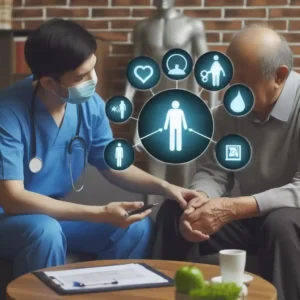Note to Readers: This blog is for the sharing of knowledge only from authentic data and does not provide medical advice, diagnosis, inspiration, or treatment. If you intend to get treatment, kindly consult a doctor for specialist advice and care.
Depression Treatment APN: Depression is a rather serious and diverse disease that affects scores of people globally. According to the American Psychopathological Association, Advanced Practice Nurses (APNs) offer appropriate care hence playing a major role in addressing depression. Based on the content of this blog, the following are how APNs diagnose, treat, and care for patients with depression and the importance of their function in the health care system.
Diagnosis and Assessment
The patients are first comprehensively interviewed and examined by the APNs through the completion of medical histories and physical exams, and by completing self-rated depression instruments such as the PATIENT HEALTH QUESTIONNAIRE (PHQ-9) and the Beck Depression Inventory (BDI). Here, such tools are beneficial in that they allow for determining the extent of depression and subsequent management.
Reference: National Institute of Mental Health (NIMH)
Treatment Options


Medication Management
APNs can independently order medications, which are antipsychotics, and antidepressants including Selective serotonin reuptake inhibitors (SSRI), Serotonin and norepinephrine reuptake inhibitors (SNRI), and atypical antidepressants. They continually assess patients for side effects of the medicines given and alter doses and schedules to suit the needed outcomes.
Reference: American Psychiatric Nurses Association (APNA)
Therapeutic Interventions
APNs give different forms of counseling such as Psychotherapy including Cognitive behavioral therapy (CBT), Interpersonal Psychotherapy (IPT), and others which are based on research findings. These therapies assist the patients to learn how to adapt or change their behavior in handling different problems in life as well as to change their thoughts which are negative and are direct results of depression.
Reference: American Psychological Association (APA)
Patient Education and Support
The management and treatment of depression involves one of the critical aspects which is education. APNs also explain to the patient and his or her family about the cause of the depression, treatment plan, and coping methods. They also include counselling services especially to the patients to ensure compliance to the treatment plans and other alterations to lifestyle that they affect due to the illness.
Reference: Centers for Disease Control and Prevention (CDC)
Collaborative Care
APNs largely practice within a team with psychiatrists, psychologists, social workers, associated PCPs, and other clinicians as the communities require it. Thus, incorporating such an approach is beneficial to the patient and enhances comprehensive, integrated care and efficient treatment.
Reference: American Nurses Association (ANA)
Holistic Approach
APNs incorporate the client’s physical, emotional, and social factors in the care they give to their patients. They treat other diseases concurrently, encourage the patients to change their diet and physical activities, and offer means to find support and care for every part of a patient’s health.
Reference: World Health Organization (WHO)
Conclusion
Advanced Practice Nurses play a very crucial role in the treatment and management of depression patients employing their medical knowledge, counseling, and touch. Those who are in a situation where they may suffer from such symptoms or a close one has them should consult a health professional. APNs and other healthcare providers are still around should you need them, to help you have a better, mentally healthy you.
Important Message
Taking care of your Mental Health is very important as well. If you start to notice any signs of Depression you need to contact a doctor right away. The sooner that you can catch this and get the help that you need the better off you will be. You need to make sure that you are talking to someone who can help you through the process and make it a little easier to cope with. Mental health professionals will be able to help you as long as let them. Your mental health is something that should be taken seriously and kept under control just like your physical health.



